

Define Objectively at Dictionary. Writing-objectives. Subjective vs. Objective: Point of view. Difference between Subjective and Objective When reading stories, books, text books or magazines there’s always two forms of writing used.
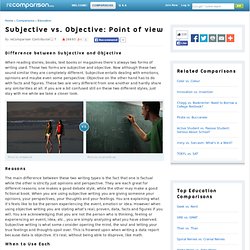
Those two forms are subjective and objective. Now although these two sound similar they are completely different. Subjective entails dealing with emotions, opinions and maybe even some perspective. Objective on the other hand has to do with facts and figures. Reasons. Difference Between Objective and Subjective. Subjective vs Objective In stories, newspapers, and the spoken word, people all over the world are trying to convince you to think as they do.

They are bombarding you with facts and figures, opinions and projections. It is up to you to create order within this chaos and find the patterns that will help you to understand what is true, what could be true, and what is outright false. Whoops! In 2008, talk show host Sean Hannity declared, “Journalism (the unbiased reporting of the facts) in America is Dead.”

He’s right. Let’s not kid ourselves. When the goal is to make headlines by making headlines, you know straight forward reporting is gone. So why try to fake it? If you’ll notice, this article originated at “Conservative Daily News”, not “Try-to-fake-objectivity-but-really-have-an-agenda News.” Yet there are still millions who beer-pong this impartial-flavored Kool-Aid by the bucket full and think they are still not being swayed.
So where do you go for the other side? Our guinea pig for this lesson comes from an Associated Press article covering the Cain campaign in Tennessee. The article draws you in with a quaint story about how Herman Cain overcame a technical snafu by entertaining the crowd with a stirring rendition of “Impossible Dream”, sans amplification. But rest easy, the attack begins now. Objectivity and Fairness - Objectivity and fairness in news stories. You hear it all the time – reporters should be objective and fair.
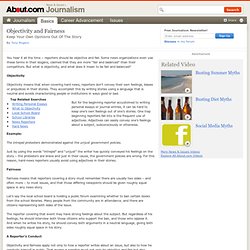
Some news organizations even use these terms in their slogans, claimed that they are more “fair and balanced” than their competitors. But what is objectivity, and what does it mean to be fair and balanced? Objectivity Objectivity means that when covering hard news, reporters don’t convey their own feelings, biases or prejudices in their stories. They accomplish this by writing stories using a language that is neutral and avoids characterizing people or institutions in ways good or bad. But for the beginning reporter accustomed to writing personal essays or journal entries, it can be hard to keep one’s own feelings out of one’s stories.
Example: The intrepid protesters demonstrated against the unjust government policies. Language, Politics, and Journalistic Objectivity. UNT talk-Objectivity in Journalism. University of North Texas Nature Writing Symposium talk: “Changing the World One Story at a Time” April 2007 Copyright © 2007 Wendee Holtcamp – bohemian@wendeeholtcamp.com Suppose you are given a bucket of water.
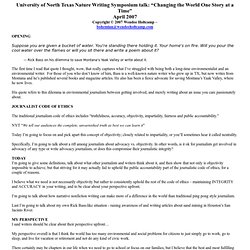
You're standing there holding it. -- Rick Bass on his dilemma to save Montana's Yaak Valley or write about it. The first time I read that quote I thought, wow, that really captures what I’ve struggled with being both a long-time environmentalist and an environmental writer. His quote refers to this dilemma in environmental journalism between getting involved, and merely writing about an issue you care passionately about. Principles of Journalism. The first three years of the Project’s work involved listening and talking with journalists and others around the country about what defines the work.

What emerged out of those conversations are the following nine core principles of journalism: 1. Questioning Journalistic Objectivity. Journalism, as we've known it, has been mourned deeply over the last few years.
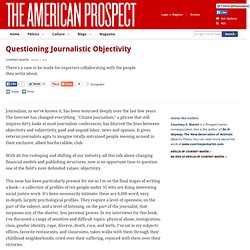
The Internet has changed everything. Public Journalism and the Problem of Objectivity. Rethinking Objective Journalism. July 8, 2003 | Like this article?
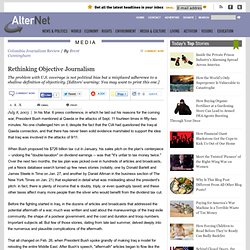
Join our email list: Stay up to date with the latest headlines via email. In his Mar. 6 press conference, in which he laid out his reasons for the coming war, President Bush mentioned al Qaeda or the attacks of Sept. 11 fourteen times in fifty-two minutes. No one challenged him on it, despite the fact that the CIA had questioned the Iraq-al Qaeda connection, and that there has never been solid evidence marshaled to support the idea that Iraq was involved in the attacks of 9/11.
When Bush proposed his $726 billion tax cut in January, his sales pitch on the plan's centerpiece -- undoing the "double-taxation" on dividend earnings -- was that "It's unfair to tax money twice. " Before the fighting started in Iraq, in the dozens of articles and broadcasts that addressed the potential aftermath of a war, much was written and said about the maneuverings of the Iraqi exile community, the shape of a postwar government, and the cost and duration and troop numbers.
Objectivity in Journalism. DAVID BROOKS There is some dispute about whether objectivity can really exist.
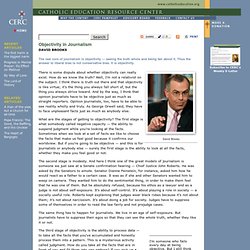
How do we know the truth? Well, I’m not a relativist on the subject. I think there is truth out there and that objectivity is like virtue; it's the thing you always fall short of, but the thing you always strive toward. And by the way, I think that opinion journalists have to be objective just as much as straight reporters. Opinion journalists, too, have to be able to see reality wholly and truly. What are the stages of getting to objectivity?
The second stage is modesty. The same thing has to happen for journalists. Objectivity (journalism) Journalistic objectivity is a significant principle of journalistic professionalism.
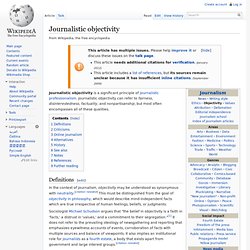
Journalistic objectivity can refer to fairness, disinterestedness, factuality, and nonpartisanship, but most often encompasses all of these qualities. Definitions[edit] The Myth of Objectivity in Journalism. By This page has been accessed since 29 May 1996. Objectivity. Journalistic Ethics, Objectivity, Existential Journalism, Standpoint Epistemology, and Public Journalism - Journal of Mass Media Ethics - Volume 16. Objectivity in Journalism: A Search and a Reassessment.